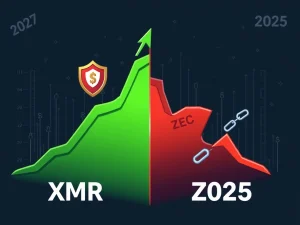Tornado Cash Co-Creator Roman Storm’s Pivotal Legal Battle: An Urgent Call for Defense Funds

The cryptocurrency world watches with bated breath as Roman Storm, co-creator of the pioneering privacy protocol Tornado Cash, faces a pivotal legal battle in Manhattan. The stakes couldn’t be higher, not just for Storm, but for the future of crypto privacy and decentralized finance itself. With his trial now underway, Storm’s legal team has issued an urgent plea: an additional $1.5 million is critically needed to sustain his defense against charges that could reshape the digital asset landscape.
Unpacking the Charges Against Roman Storm: What’s at Stake?
The trial, which commenced on July 14, 2025, centers on severe allegations against Roman Storm. Prosecutors contend that Storm conspired to launder money, violated U.S. sanctions, and operated an unlicensed money-transmitting business. The government’s narrative paints Tornado Cash, a decentralized protocol designed to obfuscate cryptocurrency transactions, as a tool exploited by illicit actors, notably the notorious North Korea-linked Lazarus Group.
The prosecution aims to prove that Storm, as a co-creator, held a level of control or knowledge that implicates him in the protocol’s misuse. They argue that despite its decentralized nature, the developers had a responsibility to prevent its exploitation for illegal activities, especially sanctions evasion. This perspective views Tornado Cash not merely as a neutral software tool, but as a service that facilitated illicit financial flows.
Conversely, Storm’s defense vehemently asserts that the protocol’s open-source nature and inherent decentralization render it uncontrollable by any individual or entity. They frame the case as a fundamental challenge to constitutional rights and regulatory boundaries in the digital age. For them, Storm is a software developer, not a financial intermediary, and the charges represent an overreach into the realm of open-source code publication.
The Pivotal Debate: Is Crypto Privacy a Right, or a Risk?
At the heart of the Roman Storm trial lies a profound philosophical and legal debate: the tension between individual crypto privacy and the imperative for regulatory oversight. Storm’s defense hinges on the argument that code publication is protected under the First Amendment, challenging the government’s ability to criminalize the creation and deployment of open-source software, even if it can be misused.
They also cite a 2019 FinCEN guidance, which suggested that developers of anonymizing tools are not necessarily required to register as money transmitters. This guidance forms a cornerstone of their argument, asserting that Storm’s actions fall outside the scope of traditional financial regulation.
The case forces a confrontation between two powerful ideas:
- Privacy as a Fundamental Right: Proponents argue that financial privacy is crucial in an increasingly surveilled world, enabling individuals and organizations to conduct transactions without undue scrutiny. Tools like Tornado Cash are seen as essential for protecting personal liberty and preventing censorship in the digital economy. Ethereum co-creator Vitalik Buterin himself has advocated for the importance of privacy in blockchain transactions, highlighting the inherent tension.
- Preventing Illicit Activity: Critics, including prosecutors, emphasize the real-world misuse of privacy tools by criminal organizations, terrorist groups, and sanctioned entities. They argue that the potential for illicit finance outweighs the benefits of absolute anonymity, necessitating robust anti-money laundering (AML) and counter-terrorist financing (CTF) measures.
The outcome of this debate will profoundly influence how privacy-enhancing technologies are developed and regulated globally.
Navigating the Complexities of DeFi Regulation: A Precedent in the Making
The Tornado Cash trial is not merely about Roman Storm; it’s a landmark case with far-reaching implications for the entire crypto ecosystem, particularly concerning DeFi regulation. The verdict could establish a critical precedent that defines the boundaries of developer liability and the legal standing of decentralized protocols.
If Storm is convicted, the consequences could be severe:
- Chilling Effect on Innovation: A guilty verdict might deter developers from building privacy-focused tools or even other open-source, decentralized applications, fearing legal repercussions for potential misuse by third parties.
- Expanded Regulatory Scope: It could signal a broader application of traditional financial laws to decentralized systems, potentially forcing developers to adopt centralized controls or ‘kill switches’ that contradict the ethos of DeFi.
- Uncertainty for Open-Source: The case could set a dangerous precedent for open-source software development, blurring the lines between creating a tool and being responsible for its users’ actions.
Conversely, a defense victory might reinforce the legal standing of decentralized protocols and expand protections for open-source innovation. It could compel regulators to develop more nuanced frameworks that acknowledge the unique characteristics of blockchain technology, rather than shoehorning it into existing, often ill-fitting, regulations designed for centralized entities.
The case highlights broader tensions between regulatory frameworks designed for centralized systems and the inherently borderless, trustless nature of blockchain technology. How do you regulate a protocol that has no central entity, no CEO, and operates autonomously on a global network?
Rallying Support: The Urgent Call for Roman Storm’s Legal Defense Fund
As the trial progresses, the financial burden on Roman Storm‘s defense has escalated dramatically, prompting an urgent call for additional support for his legal defense fund. To date, the fund has commendably raised over $3.9 million, achieving 65% of its revised $5 million target. However, an immediate need for an additional $1.5 million has been identified to cover the mounting legal costs through the trial’s anticipated conclusion.
A significant show of support came from the Ethereum Foundation, which contributed $750,000 to the fund. This substantial donation underscores the broad support from the crypto community and highlights the perceived importance of this case for the future of decentralized technologies.
The escalating costs reflect the complexity and intensity of a federal trial involving novel legal questions. Expenses include:
- Attorney fees for a specialized legal team.
- Expert witness testimonies, crucial for explaining complex technical and financial concepts to the court.
- Extensive discovery and evidence review.
- Court fees and administrative costs.
The continued success of the legal defense fund is vital for ensuring Storm receives a robust defense, which could ultimately benefit the entire ecosystem by setting a positive legal precedent.
Tornado Cash Legal Defense Fund Status
| Metric | Amount/Status |
|---|---|
| Total Raised (to date) | $3.9 million |
| Revised Target | $5 million |
| Percentage Achieved | 65% |
| Additional Funds Needed | $1.5 million |
| Key Contributions | $750,000 from Ethereum Foundation |
Contextualizing the Battle: Parallel Cases and Global Scrutiny
The legal challenges faced by Roman Storm are not isolated incidents. He co-founded Tornado Cash in 2019 alongside Alexey Pertsev and Roman Semenov. These parallel legal battles underscore the global scrutiny faced by privacy tool developers:
- Alexey Pertsev: Convicted in 2024 for money laundering tied to the protocol in the Netherlands. He is currently on Dutch parole with electronic monitoring. His conviction sets a precedent in European jurisdiction regarding developer responsibility for decentralized tools.
- Roman Semenov: Remains at large and is listed as a fugitive by the FBI. His ongoing evasion highlights the international complexities of prosecuting decentralized protocol developers.
These international actions, while distinct, inevitably cast a shadow on Storm’s U.S. trial. Prosecutors may leverage them to argue a pattern of illicit use and developer culpability, while the defense might distinguish the cases based on legal frameworks and specific roles within the project. The global nature of these legal pressures emphasizes the critical need for a clear and consistent regulatory approach to decentralized technologies.
The Community’s Divided Stance: A Philosophical Divide
As the trial enters its third week, the crypto community remains visibly divided. This division stems from fundamental philosophical differences regarding the role of privacy in the digital age and the responsibilities of technology creators:
- Proponents of Privacy: Many in the community view Tornado Cash as a vital tool for financial privacy, arguing that everyone, regardless of their activities, deserves the right to transact without constant surveillance. They see the prosecution of developers as an attack on open-source innovation and a threat to the core principles of decentralization and censorship resistance. For them, privacy is a bulwark against potential government overreach and corporate data exploitation.
- Critics and Regulatory Advocates: Others acknowledge the need for privacy but prioritize the prevention of illicit activities. They argue that tools like Tornado Cash, when used to facilitate money laundering or sanctions evasion, pose significant risks to national security and financial integrity. They believe that developers, even of decentralized protocols, should bear some responsibility for the real-world impact of their creations.
This ongoing debate highlights the complex ethical and practical challenges facing the rapidly evolving cryptocurrency landscape. Industry stakeholders, legal experts, and regulators are all keenly awaiting a ruling that could reshape the legal landscape for decentralized technologies for years to come.
Conclusion: A Defining Moment for Decentralized Finance
The trial of Roman Storm is more than just a legal battle; it is a defining moment for the future of Tornado Cash, crypto privacy, and the entire decentralized finance ecosystem. The verdict will not only determine Storm’s fate but will also send a powerful message about the legal responsibilities of developers, the interpretation of open-source code as free speech, and the applicability of traditional financial regulations to novel blockchain technologies. As the legal defense fund continues its crucial fundraising efforts, the crypto world remains united in its understanding that the outcome of this pivotal case will reverberate far beyond the Manhattan courtroom, setting a critical precedent for innovation, privacy, and regulation in the digital age.
Frequently Asked Questions (FAQs)
Here are some common questions about the Roman Storm trial and Tornado Cash:
1. What are the main charges against Roman Storm?
Roman Storm faces charges of conspiracy to commit money laundering, operating an unlicensed money-transmitting business, and conspiracy to violate the International Emergency Economic Powers Act (IEEPA) by violating U.S. sanctions.
2. What is Tornado Cash and why is it controversial?
Tornado Cash is a decentralized privacy protocol on the Ethereum blockchain designed to obfuscate cryptocurrency transactions by mixing funds from multiple users. It became controversial because while it enhances financial privacy, it was also reportedly used by illicit actors, including the North Korea-linked Lazarus Group, to launder stolen funds.
3. How much money is Roman Storm seeking for his legal defense?
Roman Storm’s legal defense fund has raised $3.9 million of a revised $5 million target. He is urgently seeking an additional $1.5 million to cover escalating legal expenses as his trial proceeds.
4. What are the broader implications of this trial for the crypto industry?
The trial’s outcome could set a significant precedent for DeFi regulation and open-source development. A conviction might deter future privacy-focused innovations and expand developer liability, while an acquittal could reinforce protections for decentralized protocols and free speech for code, influencing how traditional laws apply to blockchain technology globally.
5. Who are the other co-founders of Tornado Cash?
Roman Storm co-founded Tornado Cash with Alexey Pertsev and Roman Semenov. Pertsev was convicted in the Netherlands for money laundering related to the protocol, and Semenov remains at large, listed as a fugitive by the FBI.










